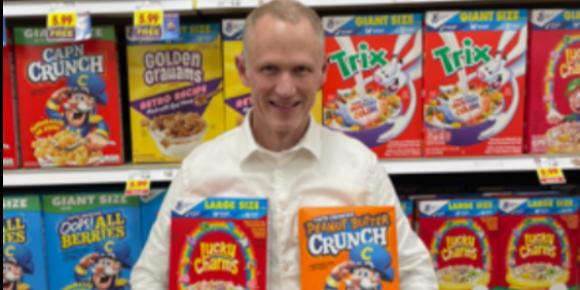What if Dr. Joe was on Ritalin?

- posted: Apr. 03, 2024
Grade school was a very difficult time for me in many ways. I struggled in math and language arts and generally had trouble with test taking, especially the big annual standardized tests that measured academic progress and overall class rank. I didn’t think I was smart. It took a lot of hard work for me to get through just grade school and high school with mostly C’s and high B’s. The only courses I was good at were art and health. Science and history weren’t too bad because I could just straight out memorize things. My teachers knew I had abilities, and they kept working with me to figure out my learning formula.
My mind would wander, and I would space out in class, obsessively counting the windows and floor squares, drawing with my fingers to connect graphics and objects in my mind. I didn't pay attention to my teachers, and this showed in my grades. I would spend hours each day drawing and writing stories in notebooks as a young adolescent. By today's standards, I would've been diagnosed with some level of attention disorder and placed on medication. The continual counting and organization of objects that needed to be “just so” would certainly have pointed professionals to obsessive-compulsive disorder (OCD) as well. I barely squeaked through high school, but later realized in undergraduate and chiropractic college that I could master certain testing and studying skills. I worked hard to improve these skills: memorizing using mnemonic devices, finishing my reading assignments through speed reading, and taking 15 to 20-minute power naps daily. My grades improved to mostly B’s and a lot more A’s.
I can’t imagine what I would have been like if, as a young kid, I had been exposed to high levels of food dyes like red 40, yellow 5/6, and blue 1; artificial ingredients such as bisphenols BPA, phthalates, nitrates or nitrites; sugars (sucrose and high fructose corn syrups); and white flours/gluten. The average child today consumes massive amounts of artificial ingredients, dye colorings, gluten, and sugar. According to the FDA and PubMed Central, artificial food dye consumption has increased by 500 percent in the last 50 years with children being the biggest consumers. Kids in the US consume 66 grams of sugar per day (16 teaspoons), which equals 53 pounds of added sugar per year. White flour and gluten are an abundant part of the American diet with the average person consuming four slices (or 10 to 20 grams) per day (that is a whole lot of bread!).
Many kids I see in my office today have poor attention and focus, don't eat right, rarely exercise, and spend most of their time in front of a phone or game console with their heads leaning down. Parenting decisions can be difficult whether it's about diet, exercise, sleep habits, or just convenience as we are all very busy and stressed. It is also difficult to deviate from the norm or change lifestyle habits. As a parent. I tried to limit the unhealthy foods my kids ate and the amount of time they were on electronic devices. At the same time, we encouraged them to be involved in sports, exercise in addition to the sports, and have regular chiropractic adjustments. My kids for years wondered why the Captain Crunch and Lucky Charms cereals they ate for breakfast didn’t look like what was on the box. I had secretly replaced the sugary cereal they were expecting with healthy, natural cereals. They still today won’t forgive me for that.
When I first started my chiropractic practice, I held educational seminars for the community, which included Ear Infections, Raising a Healthy, Drug-free Family, and What If Albert Einstein was on Ritalin?”. The most well-attended seminar by far was Einstein on Ritalin. While it's easier to take a pill than to make a drastic lifestyle change, that lack of change has long-term consequences, and you just push the problem further down the road in life. Your kid’s health, and your own for that matter, won’t improve overnight and will take hard work, learning alternative ideas, and developing new habits. It is tough making sure your kids don’t eat a lot of sugar, go to bed on time, eat nutrient-dense wholesome foods, restrict their time on technology, exercise regularly, and have regular spinal checkups. Even baby steps away from the bad and toward the good are beneficial.
It's not just kids who need good lifestyle habits. If I lose even a small amount of my normal sleep, I find it very difficult to focus and become “spacey.” If I don't exercise every day, my energy level drops and I’m easily tired, which makes me feel off-balance. I don’t often make poor food choices, but if I indulge in even a slight amount of sugar, it reduces my mental clarity, causes fatigue, and messes with my focus.
One good habit I have added to my life is high levels of pure EFA/DHA and fish oils that keep my brain focused, reduce inflammation, and optimize nerve connections/function. It doesn’t feel like my brain is “short-circuiting” anymore. Regular upper cervical chiropractic adjustments also remove nervous system interference so my thoughts and attention are always clear and laser-focused.
So why am I telling you the story? We're all creative, artistic, productive, scientific, and mathematical, but when we are clouded with sugars, dyes, bad foods, poor habits, and long work hours, we lose those innate abilities to fully express who we need to be. I truly believe and know that “God does not make junk.” God gave us all the tools and blueprints we need to be happy, healthy, and creative. But, if you put junk in your body, it will become stressed, weak, sick, unbalanced, out of alignment, less insightful, unartistic, and truly disconnected from our higher innate power. Thanks for reading, Dr. Joe


